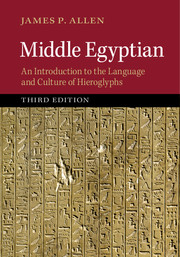Book contents
- Frontmatter
- Contents
- List of Figures
- Preface
- Lesson 1 Language and Writing
- Lesson 2 Unliteral Signs
- Lesson 3 Multiliteral Signs
- Lesson 4 Nouns
- Lesson 5 Pronouns
- Lesson 6 Adjectives
- Lesson 7 Adjectival and Nominal Sentences
- Lesson 8 Prepositions and Adverbs
- Lesson 9 Numbers
- Lesson 10 Adverbial Sentences
- Lesson 11 Non-verbal Sentences
- Lesson 12 Verbs
- Lesson 13 The Infinitival Forms
- Lesson 14 The Pseudo-verbal Construction
- Lesson 15 The Imperative and Particles
- Lesson 16 The Stative
- Lesson 17 The sdm.n.f
- Lesson 18 The sdm.f
- Lesson 19 The Other Forms of the Suffix Conjugation
- Lesson 20 Adverb Clauses
- Lesson 21 Noun Clauses
- Lesson 22 Relative Clauses
- Lesson 23 The Active Participle
- Lesson 24 The Passive Participle
- Lesson 25 Emphatic Sentences
- Lesson 26 Middle Egyptian Grammar
- Sign List
- Dictionary
- Text References
- Answers to the Exercises
- Index
Lesson 12 - Verbs
Published online by Cambridge University Press: 05 July 2014
- Frontmatter
- Contents
- List of Figures
- Preface
- Lesson 1 Language and Writing
- Lesson 2 Unliteral Signs
- Lesson 3 Multiliteral Signs
- Lesson 4 Nouns
- Lesson 5 Pronouns
- Lesson 6 Adjectives
- Lesson 7 Adjectival and Nominal Sentences
- Lesson 8 Prepositions and Adverbs
- Lesson 9 Numbers
- Lesson 10 Adverbial Sentences
- Lesson 11 Non-verbal Sentences
- Lesson 12 Verbs
- Lesson 13 The Infinitival Forms
- Lesson 14 The Pseudo-verbal Construction
- Lesson 15 The Imperative and Particles
- Lesson 16 The Stative
- Lesson 17 The sdm.n.f
- Lesson 18 The sdm.f
- Lesson 19 The Other Forms of the Suffix Conjugation
- Lesson 20 Adverb Clauses
- Lesson 21 Noun Clauses
- Lesson 22 Relative Clauses
- Lesson 23 The Active Participle
- Lesson 24 The Passive Participle
- Lesson 25 Emphatic Sentences
- Lesson 26 Middle Egyptian Grammar
- Sign List
- Dictionary
- Text References
- Answers to the Exercises
- Index
Summary
12.1 Introduction
Verbs are words that languages use to describe actions. In a clause or sentence, nouns and pronouns are normally the subject (what is being talked about), while verbs are usually the predicate (what is said about the subject: § 7.1). In English, every clause or sentence has a verbal predicate; Egyptian, however, can make clauses or sentences without verbs, as we have seen in the preceding lessons.
Verbs are the most complex part of any language. The other elements—nouns, pronouns, adjectives, prepositions, adverbs, and particles—have one or a few forms (such as singular and plural, masculine and feminine), but verbs typically have many different forms. The English verb throw, for example, has not only the simple forms throw, throws, threw, thrown, and throwing, but also numerous compound forms such as will throw, should throw, have thrown, had thrown, is thrown, is throwing, will be throwing, should have been thrown, were to have been throwing, and so forth.
Because of this feature, verbs are typically the most difficult and time-consuming part of learning any language. This is as true for Middle Egyptian as it is for a modern language such as English. Egyptian verbs are mostly simpler than those of English, but in some ways they are more complex. This lesson will give us an overview of the Middle Egyptian verb, but it will take the rest of this book for us to examine all the verb forms, their meanings, and their uses in Egyptian sentences.
- Type
- Chapter
- Information
- Middle EgyptianAn Introduction to the Language and Culture of Hieroglyphs, pp. 163 - 178Publisher: Cambridge University PressPrint publication year: 2014



